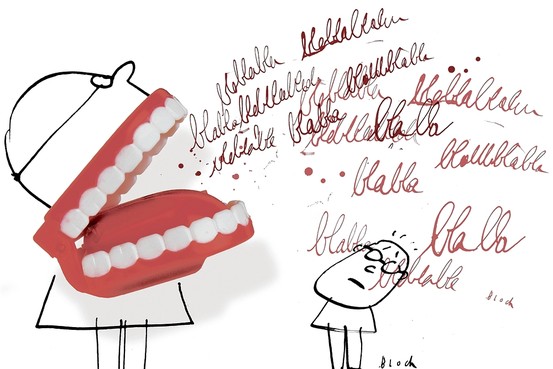Fighting for Air Time in an Interview
I’m an observer and sometime eavesdropper. It’s hard not to be when sitting at Starbucks and I see that someone is being interviewed. This morning I noticed a man reviewing and taking notes on resumes. From his body language, I could see he was waiting for someone and indeed a young woman walked in and introduced herself. Hello, I’m Taylor were the last words she got to say. I had to stay to see what would transpire. I started the stop watch on my phone and watched the interaction between interviewer and candidate. It was a full 19 minutes before he asked a question—a closed-ended one at that—and Taylor got to say yes. There was no way I was getting up until this interview was over.
For 45 minutes the interviewer talked and took notes (on what I have no idea since he did all the talking) while Taylor sat there nodding, occasionally getting a word in and looking like oh man, this interview isn’t going well. The interview ended and within a few minutes the next candidate walked in. I didn’t stay, I had seen and heard enough.
Now, I know you are all thinking he was a terrible interviewer and he was, but it’s Taylor’s responsibility in the interview to communicate her value. Here are some ways down she could have turned the interview into a more balanced conversation.
Do not wait for questions
For Taylor, the questions never came. She needed to try and find pauses where she could jump in with relevant points about her experience. This can be tough to do without sounding rude or awkward, but it’s your only option. Look for a window of opportunity and dive in. Like this:
Interviewer: “Some projects have crushing deadlines and we can pull an all-nighter. That actually happens a lot around here and…”
You: “Sorry to interrupt, but that’s great to know—during my internship last summer I found my organization skills really helpful in getting work done. I’d love to tell you about how I organize work.”
Now, wait and let the interviewer take the next step. If s/he notices what you just did, the interviewer will take your cue and ask a probing follow-up question such as, “How do you manage a heavy work load? What were some of those challenges you had?” “How did you handle these challenges?” The interview is now on track, and hopefully will stay there.
If the interviewer does not take the cue from you, and begins talking some more, wait until an appropriate time to interject and transition the discussion back to yourself again. Taking the ball back into your court does not need to feel awkward. Choose your timing carefully. Do this as many times as you need in order to get your experience and accomplishments known.
Shift your position
Taylor could have used the power of body language. Shifting her position would have sent a subtle message of, “Hey, we’ve been at this for some time, it’s time to switch gears.”
When you’re ready to start diving in to the conversation, shift in your seat a bit, uncross and re-cross your legs, smile and lean forward to subtly signal that you’re ready to go. (Unfortunately, this doesn’t work in a phone interview—but quietly clearing your throat and saying a quick, “Excuse me,” can have a similar effect.)
Wrap-up the interview
Taylor did not get the chance to share what she thought and could have asked for a few extra minutes of time or the opportunity to follow up with additional details about her background. If you don’t get a chance to talk about your experience and value, you can offer to share them with the interviewer after the fact.
Interviewer: “Well, I’m out of time. Thanks so much for coming in.”
You: “Thanks for talking with me. It’s been great to hear about the position and company. I know we’re out of time, but I have some ideas about how I could contribute to the team’s goals (this shows you listened to the interviewer.) Do you have a few extra minutes now, or can I follow up with an email outlining what I have worked on?”
By doing this, you may get more time or a second chance to show off your skills—and that’s a big advantage over the other interviewees who left without getting an opportunity to talk.
Dealing with an over-talker is certainly frustrating. Be kind, smile frequently and do everything you can to get your message across.
**Taylor, my apologizes for eavesdropping.**



